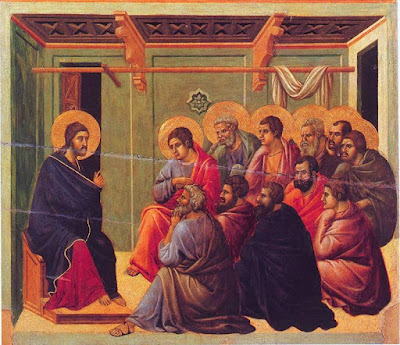[Lifting up his eyes to heaven, Jesus prayed, saying, “Holy Father] I do not pray for these only, but also for those who believe in me through their word, that they may all be one; even as thou, Father, art in me, and I in thee, that they also may be in us, so that the world may believe that thou hast sent me.”
- St. John 17:20, 21
The Gospel for the Sunday after Ascension, which is the seventh and final week of Eastertide, puts us back in the Cenacle, the Upper Room. We are taken to that night of nights, when our Lord gave us so much, and when He taught us so much. On that night He prayed His great High Priestly prayer, entrusting us to the purpose and mission for which we have been created.
Our Lord’s aim and mission during His earthly ministry was to glorify His heavenly Father by His obedience. All He said and did gave glory to His Father. On the eve of His sacrifice on the cross and in the presence of His disciples, Jesus made His high priestly prayer: "Holy Father, keep them in your name that they may be one as we are one". Our Lord prayed for the unity of His disciples and for all who would believe in Him. His prayer for His people is that we be united with God the Father in His Son and through His Holy Spirit and so be joined together in unity with all who are members of Christ's body.
What was it that motivated Jesus to lay down His life on the cross as the atoning sacrifice for the sin of the world? It was love – divine love - love for His Father in heaven and love for each one of us, made in the image and likeness of God.
Jesus was sent into the world by His Father for a purpose, and that purpose is a mission of love to free us from slavery to sin – to liberate us from slavery to Satan, to fear, to death, to hopelessness. Jesus saw glory in the cross rather than shame. Obedience to His Father's will was His glory. Jesus kept His Father's word even when, on that dark night in Gethsemane, He was tempted to forgo the cross. Jesus did not rely on His own human resources and strength to accomplish his Father's will. He trusted in His Father to give Him strength, courage, and perseverance in the face of opposition, trials, and temptation.
Because God created us for a purpose and a mission, we also must take up our cross and follow the Lord Jesus wherever He may call us. He will give us the strength and power of the Holy Spirit to live as His disciples.
St. John Henry Cardinal Newman wrote: "God has created me to do him some definite service; he has committed some work to me which he has not committed to another. I have my mission - I may never know it in this life, but I shall be told it in the next. I am a link in a chain, a bond of connection between persons. He has not created me for nothing. Therefore, I will trust him. Whatever, wherever I am, I cannot be thrown away."
And so we must trust in God and in His call and purpose for our life.
Jesus prayed that His disciples would be sanctified and consecrated in God's truth and holiness. The scriptural word for “consecration” comes from the same Hebrew word which means “holy” or “set apart for God.” And it also means to be equipped with the qualities which will enable us to fulfill our vocation.
Just as Jesus was called by the Father to serve in holiness and truth, so we, too, are called and equipped for the task of serving God in the world as His ambassadors. God's truth frees us from ignorance and the deception of sin. It reveals to us God's goodness, love, and wisdom. And it gives us a thirst for God's holiness.
The Holy Spirit is the source and giver of all holiness. As we allow the Holy Spirit to work in our lives, He transforms us by His purifying fire and changes us into the likeness of Christ.
May our lives be consecrated to God, may we be wholly pleasing to God. May we be sanctified in God’s truth, and may we be guided by the Holy Spirit so that we may follow faithfully wherever God leads us.
_______________________________
Pictured: “The High Priestly Prayer”
by Eugène Burnand (1850-1921)














.jpg)

